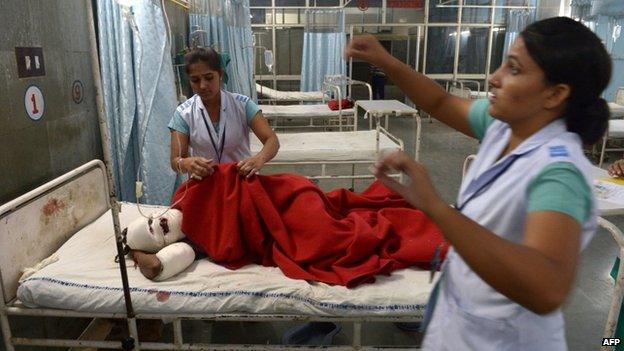Indian media: Police 'failure' to arrest Haryana guru
- Published

Several people have been injured in clashes between the police and the guru's supporters
Papers are criticising police for failing to arrest a Hindu guru in the northern Indian state of Haryana.
Several policemen were injured in a clash with the supporters of the controversial guru on Tuesday.
The 63-year-old self-styled guru, known as Rampal, is on bail after being accused in a 2006 murder case.
But authorities ordered his arrest on contempt charges after he failed to appear in court several times.
The clashes occurred when the police went to arrest Rampal in his ashram. Police say armed supporters are holding people hostage and using women and children as human shields.
"The bid by the cops to nab him exposed several flaws in their strategy and operational preparedness… Despite keeping close watch on the premises and armed with the prior knowledge of weapons in the ashram, the police appeared completely unprepared and they were the worst hit during the action," The Times of India, external says.
Many journalists who were covering the clashes were also injured, reports said.
The Asian Age, external says the police "used batons against several media people covering the clash between sect followers and the security forces".
The police have promised to look into the allegations, the India Today, external website reports.
"The moment this operation is over, we will get it looked into... There was no intentional or operational compulsion to target the media," the website quotes top police official SN Vashisht as saying.
Meanwhile, papers feel Prime Minister Narendra Modi's visit to Australia has "scripted a new chapter" in India's ties with the country.
Mr Modi met Prime Minister Tony Abbott in Canberra on Tuesday and also addressed Australian lawmakers.
Australia ties
The leaders pledged to boost bilateral trade and agreed to speed up talks on a crucial nuclear agreement.
"Bilateral trade between the two countries has lagged considerably behind the potential. The actual trade languishes at just $15bn, against a $40bn target by 2015," says The Hindu, external in an editorial.
The two countries have now agreed to sign a free trade agreement by 2016 to boost bilateral trade.
Papers say the personal camaraderie between the two leaders is likely to help Delhi and Canberra work closely on global issues like security, terrorism and economy.
"Mr Modi's vigorous approach to Asia is matched by his Australian counterpart Tony Abbott's enthusiasm for partnership with India," says The Indian Express, external editorial.
Apart from trade, the paper sees the two countries coming together to form a regional bloc in the Asia Pacific region.
"Given the bilateral enthusiasm for expanding the circle of engagement, Delhi and Canberra must initiate a joint dialogue with Indonesia and also pull Japan in to bulwark the region against the vicissitudes of China-US relations," it adds.
The Hindustan Times, external praises Mr Modi's outreach to Australian lawmakers and his initiatives to start several track II diplomatic channels.
"In a well-received address to the Australian parliament, Mr Modi memorably underlined that Australia will not be at the periphery of India's vision 'but at the centre of our thought'," it says.
The paper adds that "the India-Australia relationship will now be one to look out for in the fast evolving Asia Pacific region".
Conservation concerns
In some domestic news, fresh data shows that more than 90% of the rape cases in Delhi this year were committed by those known to the victims.
The Delhi police told a court on Tuesday that in many cases the suspects were fathers, uncles, neighbours, friends and even grandfather, The Hindu, external reports.
"A total of 1,704 cases were registered till 15 October this year, and the accused were strangers only in 72 cases," according to the data submitted by the Delhi police.
And finally, the International Union for Conservation of Nature (IUCN) has raised concerns over the condition of India's world heritage sites like the Western Ghats, Kaziranga National Park and the Sundarbans, The Hindu, external reports.
"Assessing the threats faced by the sites, the IUCN experts observed that there was 'extraordinary' pressure on biodiversity remains in the Western Ghats, given the 'tremendous population pressure both within and surrounding the property," the report adds.
BBC Monitoring reports and analyses news from TV, radio, web and print media around the world. . You can follow BBC Monitoring on Twitter, external and Facebook, external.